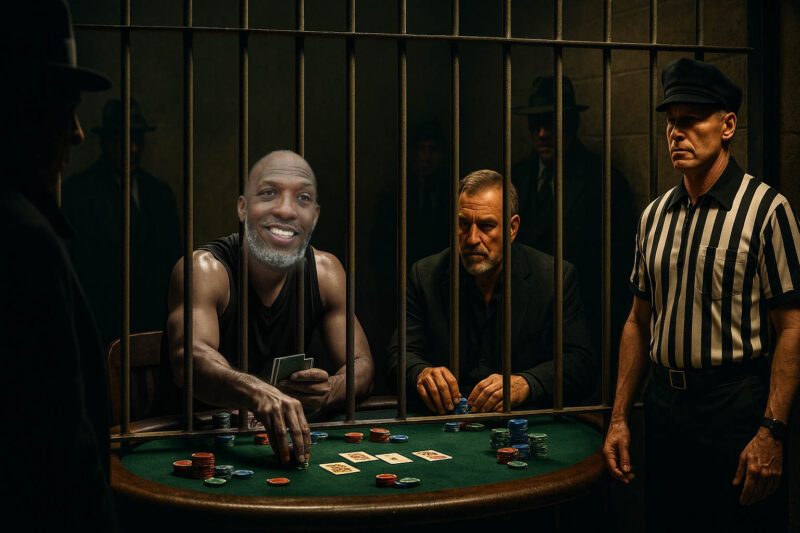he October 2025 federal indictments that rocked the NBA did not stop at basketball. At the core of the arrests was an elaborate, Mafia-backed network of rigged high-stakes poker games, where professional basketball figures—including Portland Trail Blazers head coach Chauncey Billups—were used to attract wealthy players into a scheme designed to defraud them of millions.
This case exposes the darker side of poker’s high-roller world and reveals the sophisticated cheating methods organized crime continues to employ. Billups was also implicated in a sports betting scandal under a different variation of the poker investigation.
The Poker Operation
According to prosecutors, Mafia families including the Gambino, Bonanno, Lucchese, and Genovese syndicates organized a series of clandestine, invitation-only poker events. These games were set up to look like glamorous, exclusive affairs, hosted in luxury hotels and private clubs. In reality, they were meticulously rigged.
The techniques described in the indictment read like a blueprint for high-level poker fraud:
- Manipulated shuffling machines that allowed dealers to know future card order.
- X-ray and infrared tables capable of identifying card values.
- Marked decks and signal systems for collusion among insiders.
- Enforcers on site to keep players from walking away or questioning results.
The Department of Justice estimates victims collectively lost more than $7 million in these games.
Chauncey Billups’ Role
Billups, celebrated in the NBA as the 2004 Finals MVP and a respected head coach, allegedly became the “celebrity draw” for the operation. His presence added credibility and allure, enticing wealthy businessmen, athletes, and entertainment figures to sit down at the tables.
Prosecutors claim Billups lent not just his name but his physical presence to the events, essentially acting as a trusted front man while games were quietly manipulated. He faces charges of wire-fraud conspiracy and money-laundering conspiracy tied to these poker games.
Damon Jones and Other Associates
Former NBA player Damon Jones, now a coach, was also named in the poker indictment. Like Billups, he was used as bait to bring high-value victims to the tables. Both men are accused of knowingly associating with Mafia operators who rigged the games.
Other defendants include known mobsters and technology specialists who engineered the cheating systems. Together, the network represented one of the most sophisticated illegal poker rings uncovered in recent years.
Why This Scandal Matters to Poker
This scandal underscores issues that resonate deeply with the poker community:
- Trust in the Game
Poker’s entire legitimacy hinges on fairness. When underground games use celebrities to draw in players while manipulating outcomes, it damages trust not only in those games but in poker culture as a whole. - Technology and Cheating
From rigged shufflers to infrared tables, organized crime showed how modern technology can weaponize poker cheating. These methods can, in theory, be adapted to online or hybrid formats, raising concern across the industry. - The Celebrity Factor
Using star athletes as a hook for victims illustrates the dangers of “celebrity poker nights.” When a famous name is attached to a game, many players assume legitimacy. This case proves that assumption can be disastrously wrong. - Mafia Persistence
Despite decades of enforcement, Mafia families remain embedded in gambling. They are adept at finding new profit channels, whether through sports betting, poker, or online laundering.
Implications for Online Poker
Although this case revolved around live underground games, online platforms face similar risks:
- Collusion and signalling can happen in digital formats.
- Rigged software or bots could mimic the manipulation seen in live games.
- Celebrity endorsement of online poker rooms could be exploited if platforms don’t enforce strict oversight.
Operators will likely face more regulatory scrutiny as lawmakers tie this scandal to wider gambling integrity issues.
The Victims
Reports suggest the players targeted were not amateurs but wealthy professionals and celebrities invited under the guise of high-stakes exclusivity. They were offered games with Billups or Jones at the table, convinced they were playing fair poker against famous competition.
Instead, the odds were stacked against them before the first hand was dealt. Some lost millions in a single night.
The Money Trail
Organized crime families allegedly funneled profits through shell corporations, crypto wallets, and overseas accounts. The games served a dual purpose: generating massive profits while also laundering money from other criminal activities.
The inclusion of Billups and Jones provided cover and legitimacy, making the games appear as social networking events rather than a criminal enterprise.
Potential Fallout
- NBA Fallout: Billups’ coaching career is likely over, regardless of trial outcome. His reputation as a Finals MVP has been permanently scarred.
- Poker Fallout: The scandal may trigger new calls for stricter oversight of celebrity poker events and underground games.
- Legal Fallout: If convicted, defendants face long prison terms for fraud, racketeering, and money laundering.
- Industry Fallout: Licensed casinos and poker platforms may use this case to push regulators to clamp down on unlicensed games, portraying themselves as the safe alternative.
Lessons for the Poker World
For players and fans:
- Avoid unlicensed or underground games, no matter the celebrity draw.
- Question environments where technology is controlled entirely by insiders.
- Recognize that “invite-only” often means lack of oversight, not exclusivity.
For operators and regulators:
- Invest in monitoring and anti-cheating measures.
- Audit shuffling systems and digital platforms regularly.
- Hold celebrity ambassadors to high vetting standards.
Conclusion
The Chauncey Billups poker scandal demonstrates how organized crime continues to adapt, using celebrity appeal and modern cheating technology to rig outcomes and launder millions. For poker, the story is a harsh reminder that integrity is everything.
When trust at the table is broken, the entire game suffers. And when the faces used to sell that trust are NBA champions and coaches, the fallout reverberates far beyond the felt.


